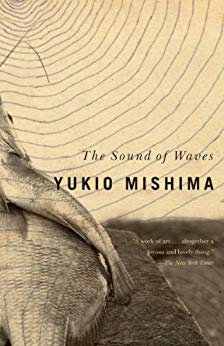More on this book
Community
Kindle Notes & Highlights
As for Shinji, he was not sensitive and easily wounded the way a city-bred boy is during the time of his first love, and to Shinji the old man’s raillery was actually soothing and comforting
crinum lilies
some of the women were already diving in the cold water for the seaweed called “soft lace.”
Shinji, not clever at scheming, had been able to discover no way to meet Hatsue.
Whenever she found herself unoccupied she was apt to let herself become upset with all sorts of unnecessary worries.
The house was filled with silence, and the odor of the toilet floated on the air.
THE YOUNG GIRLS of the island faced the arrival of the diving season with precisely the same heart-strangling feeling city youths have when confronted by final school-term examinations.
There was, however, one beautiful pair that had become the object of everyone’s admiration, including that of Shinji’s mother. These were the breasts of Hatsue.
Hatsue was by nature not a talkative person.
Even now during the breast-beautiful contest it was mainly the older women who were doing all the talking,
Between two small mounds that held on high their rose-colored buds there was a valley that, though darkly burned by the sun, still had not lost the delicacy, the smoothness, the veined coolness of skin—a valley fragrant with thoughts of early spring. Keeping pace with the normal growth of the rest of her body, her breasts were in no way late in their development. Yet their roundness, still tinged with the firmness of childhood, seemed on the verge of awakening from sleep, seemed ready to come awake at the slightest touch of a feather, at the caress of the slightest breeze.
Hatsue laughed and tossed her head. A piece of green, transparent seaweed fell from her hair to the dazzling sand.
The divers always felt bold and open-handed when they were beside the sea.
The divers who were left behind gathered around the old peddler and sang songs.
He was a zealous member of the Nichiren sect,
When there was no work to be done with the cargo, or during their rest periods, the crew would loll about on the thin straw matting that covered the three-mat space in the center of their quarters
and listen to a portable phonograph. There were only a few records, and most of them were so worn out that they produced only dingy music through the scratching of a rusty needle.
Without exception they were all sentimental ballads concerning ports or sailors, fog or memories of women, the So...
This highlight has been truncated due to consecutive passage length restrictions.
As for Shinji, he always sat silent, hugging his knees and smiling as he listened to the others’ opinions. “There’s no doubt but what the boy’s a fool,” the chief engineer once told the captain.
It gradually became abundantly clear to the crew that Yasuo was lazy.
The neighing of the wind and the roar of the sea, surprisingly enough, gave the infinite night that enveloped them a quality of frenzied serenity.
Someone can just swim out to the buoy and tie the lifeline to it.”
Like mice tugging at a rice cake,
“Which one of you fellows is going to take this lifeline over there and tie it to that buoy?”
Moved by a spirit of helpfulness, the other women went into noisy conclave with each other, like a flock of water fowl beside a river,
The other five women stood just outside the door, their sunburned faces thrusting forward like so many cactus leaves,
“The only thing that really counts in a man is his get-up-and-go. If he’s got get-up-and-go he’s a real man, and those are the kind of men we need here on Uta-jima. Family and money are all secondary. Don’t you think so, Mistress Lighthouse-Keeper? And that’s what he’s got—Shinji—get-up-and-go.”
the sound of the waves
Out in front of them stretched the unfathomable darkness,
Once again it came to pass that Shinji, little given to thinking as he was, was lost in thought.
He was thinking that in spite of all they’d been through, here they were in the end, free within the moral code to which they had been born, never once having been estranged from the providence of the gods
that, in short, it was this little island, enfolded in darkness, that had protected their happiness and brought ...
This highlight has been truncated due to consecutive passage length restrictions.
The Sea of Fertility tetralogy—which contains the novels Spring Snow (1969), Runaway Horses (1969), The Temple of Dawn (1970), and The Decay of the Angel (1971)—is considered one of the definitive works of twentieth-century Japanese fiction.


